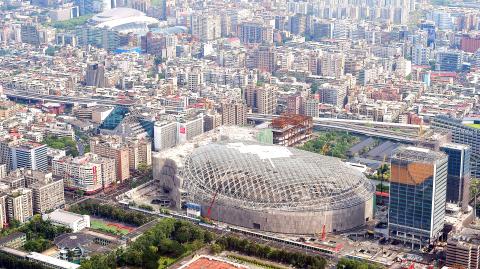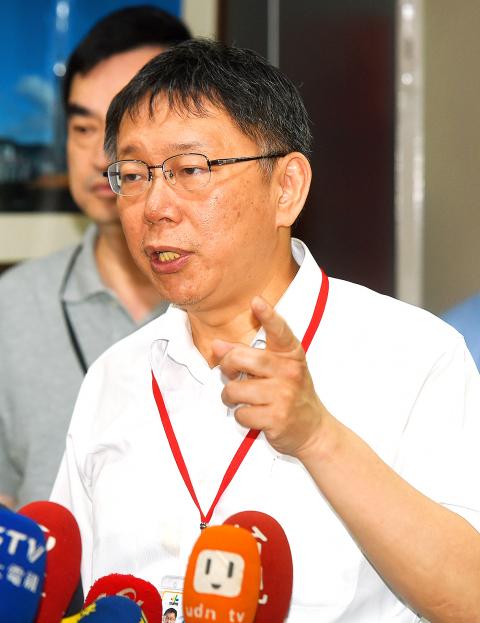The Taipei City Government last night ordered Farglory Land Development Co (遠雄建設) to halt construction of the Taipei Dome, citing concerns about “ongoing damage” to the neighboring Songshan Tobacco Factory and a “threat” to the Taipei MRT Bannan (板南) Line, which runs next to the construction site.
The announcement came less than 10 hours after Taipei Mayor Ko Wen-je (柯文哲) said he felt “the company is too arrogant” and was considering ordering the firm to cease construction until it provides a clear explanation of how it plans to guarantee safety at the site.
Ko said he was “angry” and “could not stand” Farglory’s “insincere” attitude.

Photo: Fang Pin-chao, Taipei Times
The company submitted only a single sheet of paper after being requested to provide a report on improving safety on Monday, even though abnormalities had been found on site since March.
“I feel [Farglory] is irresponsible, because it now says that construction on the foundations [of the Taipei Dome] would be drawn out until August,” Ko said.
The city government agreed to allow construction to continue when safety concerns first emerged on the grounds that the Taipei Dome would be structurally unstable until the foundations were completed.

Photo: Chien Jung-fong, Taipei Times
When asked if halting construction would be dangerous, Ko said that the firm had to provide a clear explanation of how it would address safety issues if construction was allowed to continue.
He added that the safety issues had to be addressed before any discussions took place on contractual issues.
Numerous media reports earlier yesterday said that the city government had reached a preliminary consensus with Farglory in talks on Tuesday between Farglory chairman Chao Teng-hsiung (趙藤雄) and Taipei Deputy Mayor Teng Chia-chi (鄧家基).
The reports said Farglory and the city had agreed to set up a third-party commission to investigate safety at the venue, breaking a standoff over the validity of a city-sponsored probe that called for either the Dome or its neighboring shopping mall to be demolished.
Teng denied the existence of any consensus.
“The city government absolutely did not accept Farglory’s proposals for a third-party evaluation,” he said, adding that Taipei had instead invited Farglory to submit its own plans to improve site safety.
“Without substantial content [regarding improving site safety], calling for a third-party evaluation is simply equivocating,” Teng said.
Farglory also chose to stall on construction safety issues in the hopes that the issue would blow over by the time the site’s foundations were completed, he said, adding that the issue was separate from concerns over the safety of the completed site.
As construction risks could increase with time, Farglory was responsible for giving the city a clear response on the costs and benefits of continued construction, he said.
Ko also said that Chao “reeked of alcohol” when he came in for talks, but added that he himself had not met with Chao.
In a statement, Farglory rejected Ko’s alcohol comment and called on the city to name the person who had given the mayor “mistaken information.”
The firm said the comment was a “groundless accusation” bordering on slander and “public humiliation,” and that it would take legal measures in response.

CHAOS: Iranians took to the streets playing celebratory music after reports of Khamenei’s death on Saturday, while mourners also gathered in Tehran yesterday Iranian Supreme Leader Ayatollah Ali Khamenei was killed in a major attack on Iran launched by Israel and the US, throwing the future of the Islamic republic into doubt and raising the risk of regional instability. Iranian state television and the state-run IRNA news agency announced the 86-year-old’s death early yesterday. US President Donald Trump said it gave Iranians their “greatest chance” to “take back” their country. The announcements came after a joint US and Israeli aerial bombardment that targeted Iranian military and governmental sites. Trump said the “heavy and pinpoint bombing” would continue through the week or as long

TRUST: The KMT said it respected the US’ timing and considerations, and hoped it would continue to honor its commitments to helping Taiwan bolster its defenses and deterrence US President Donald Trump is delaying a multibillion-dollar arms sale to Taiwan to ensure his visit to Beijing is successful, a New York Times report said. The weapons sales package has stalled in the US Department of State, the report said, citing US officials it did not identify. The White House has told agencies not to push forward ahead of Trump’s meeting with Chinese President Xi Jinping (習近平), it said. The two last month held a phone call to discuss trade and geopolitical flashpoints ahead of the summit. Xi raised the Taiwan issue and urged the US to handle arms sales to

State-run CPC Corp, Taiwan (CPC, 台灣中油) yesterday said that it had confirmed on Saturday night with its liquefied natural gas (LNG) and crude oil suppliers that shipments are proceeding as scheduled and that domestic supplies remain unaffected. The CPC yesterday announced the gasoline and diesel prices will rise by NT$0.2 and NT$0.4 per liter, respectively, starting Monday, citing Middle East tensions and blizzards in the eastern United States. CPC also iterated it has been reducing the proportion of crude oil imports from the Middle East and diversifying its supply sources in the past few years in response to geopolitical risks, expanding

OTHER OPTIONS: Given possible US intervention and Taiwanese counterattacks, China might opt to blockade Taiwan or take its outlying islands instead of an all-out invasion A US think tank has urged Taiwan to adopt a “hellscape” strategy that would flood the Taiwan Strait with drones and other uncrewed systems to deter invasion by China. In its report, Hellscape for Taiwan, published on Thursday, the Center for a New American Security said Taipei’s asymmetric defense approach — often described as a “porcupine strategy” — needs to evolve to keep pace with the growing capabilities of the Chinese People’s Liberation Army. The “hellscape” strategy involves saturating the air and waters around Taiwan with thousands of drones and other platforms capable of striking invading forces from multiple domains at once. Long-range